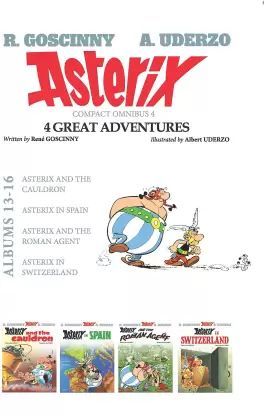Best known as the author of Asterix, Goscinny is
also the talent behind the scenario of Lucky Luke, the hugely popular
comic book of ‘the cowboy who shoots faster than his shadow’. Goscinny
was born on 11 August 1926 in the 5th arrondissement of Paris, the son
of Stanislas (Simkha) from Warsaw and of Anna Beresniak from
Khodorkow, a small Ukrainian village. In 1928, his parents took him to
Argentina, where his father, a chemical engineer, had been
seconded. He spent a happy childhood in Buenos Aires, and studied at
the French Lyce just before the Second World War. He had a habit of
making every one laugh in class, probably to compensate for a natural
shyness. He started drawing very early on, inspired by the illustrated
stories which he enjoyed reading. In 1945, he emigrated to the United
States. “I went to the United States to work with Walt Disney” he was
to say later “but Walt Disney didn’t know that”. He found himself in
New York, jobless, alone and totally broke. The next 6 years, which he
spent in New York, are often considered his formative years. As he
said “It was not so bad…it toughened me up, although I would have
liked it better if others had been toughened up on my behalf”. It is
during these years that he met his first friends, some who were to
publish “Mad” in 1945, and others with whom he was to collaborate for
a long time to come. Among these was Maurice de Bvre aka Morris, the
cartoonist and first author of Lucky Luke. He also met Georges
Troisfontaines, the boss of the World Press Agency in Belgium, who
persuaded Goscinny to work for him. He returned to Europe in 1951 for
this purpose, but was fired in 1956 for trying to put in place a
charter to protect the status of cartoonists and scenarist. The years
until the creation of the magazine “Pilote” were years of transition,
when Goscinny’s talent matured and he seized upon many
opportunities. Besides his collaboration with Morris on the Lucky Luke
series from 1955 onwards, Goscinny worked on the scenario of “Le petit
Nicolas” (Little Nicholas) in cartoon form with its creator, Sempe. In
1959 the magazine “Pilote” was launched. Goscinny found his place in the
editorial team among some of his faithful friends from World
Press. The aim of “Pilote” was to change radically the way that the
graphic novel (“the BD”) would be perceived in France, and competed
with “Tintin” and “Spirou” magazines on their own territories. How best to
go about that task than by inventing an astute little Gaul, give him a
large size sidekick and place their adventures within a little village
of irreducible Gauls whose names all end in -ix? Asterix is born. The
bande dessinee enters adulthood. He married Gilberte Pollaro-Millo in
1967. In 1968 his daughter Anne is born. Many young authors owe their
fame to Goscinny, who opened for them the pages of “Pilote”. While
working on scenarios for the television and the cinema and on many
different texts, Goscinny headed Pilote in one capacity or another
until his death on 5 November 1977.



